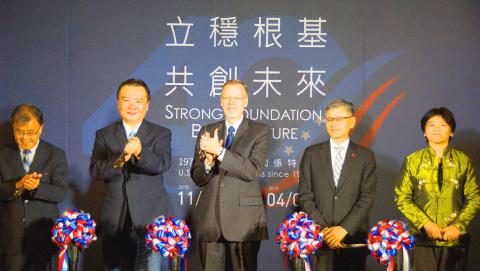The American Institute in Taiwan (AIT) yesterday confirmed that it purchased a plot of land in Taipei to build a residential complex for its staff, saying the decision reflects the US’ strong long-term commitment to the nation.
“On Nov. 28, 2018, AIT finalized a conditional purchase agreement with Jean Co, Ltd [新美齊] for the construction of a new residential tower in Tianmu [天母] and purchase of the underlying land,” AIT spokesperson Jesse Curtis said in an e-mail.
“When completed, AIT plans to use the residential tower as housing for AIT staff and their families,” Curtis said, confirming a report in the Chinese-language Liberty Times (the Taipei Times’ sister newspaper) about the deal.

Photo: CNA
It was not the AIT’s first real-estate purchase in Taiwan, as the newspaper had reported, he said without elaborating.
The purchase reflected the US’ commitment to its ties with Taiwan, but did not indicate any change in the US’ “one China” policy or its commitments under the Taiwan Relations Act, Curtis said.
“The US is strongly committed to our enduring friendship with Taiwan, with whom we share common values and enjoy close cooperation on a wide range of regional and global issues,” he said. “The purchase of real property on Taiwan is another reflection of this commitment.”

Photo: Hsu Yi-ping, Taipei Times
Presidential Office spokesman Sidney Lin (林鶴明) welcomed the purchase, saying that it symbolizes the progression of Taiwan-US ties over the past two years.
Chinese Nationalist Party (KMT) Chairman Wu Den-yih (吳敦義) said renting houses is not a permanent solution, and that he believed the deal is a clear signal that the ties between Taiwan and the US are strong and solid.
The 1,000m2 plot of land and construction of the building is to cost NT$1.16 billion (US$37.6 million), Jean Co said.
The AIT in June held a dedication ceremony for its new compound in Taipei’s Neihu District (內湖), the first purpose-built facility by a foreign representative office in the nation.
The AIT is still operating out of its compound on Xinyi Road in Taipei, where it has been for almost 40 years, but is expected to officially move into the Neihu compound next month.
Additional reporting by staff writer

AGING: As of last month, people aged 65 or older accounted for 20.06 percent of the total population and the number of couples who got married fell by 18,685 from 2024 Taiwan has surpassed South Korea as the country least willing to have children, with an annual crude birthrate of 4.62 per 1,000 people, Ministry of the Interior data showed yesterday. The nation was previously ranked the second-lowest country in terms of total fertility rate, or the average number of children a woman has in her lifetime. However, South Korea’s fertility rate began to recover from 2023, with total fertility rate rising from 0.72 and estimated to reach 0.82 to 0.85 by last year, and the crude birthrate projected at 6.7 per 1,000 people. Japan’s crude birthrate was projected to fall below six,

US President Donald Trump in an interview with the New York Times published on Thursday said that “it’s up to” Chinese President Xi Jinping (習近平) what China does on Taiwan, but that he would be “very unhappy” with a change in the “status quo.” “He [Xi] considers it to be a part of China, and that’s up to him what he’s going to be doing, but I’ve expressed to him that I would be very unhappy if he did that, and I don’t think he’ll do that. I hope he doesn’t do that,” Trump said. Trump made the comments in the context

SELF-DEFENSE: Tokyo has accelerated its spending goal and its defense minister said the nation needs to discuss whether it should develop nuclear-powered submarines China is ramping up objections to what it sees as Japan’s desire to acquire nuclear weapons, despite Tokyo’s longstanding renunciation of such arms, deepening another fissure in the two neighbors’ increasingly tense ties. In what appears to be a concerted effort, China’s foreign and defense ministries issued statements on Thursday condemning alleged remilitarism efforts by Tokyo. The remarks came as two of the country’s top think tanks jointly issued a 29-page report framing actions by “right-wing forces” in Japan as posing a “serious threat” to world peace. While that report did not define “right-wing forces,” the Chinese Ministry of Foreign Affairs was

PREPAREDNESS: Given the difficulty of importing ammunition during wartime, the Ministry of National Defense said it would prioritize ‘coproduction’ partnerships A newly formed unit of the Marine Corps tasked with land-based security operations has recently replaced its aging, domestically produced rifles with more advanced, US-made M4A1 rifles, a source said yesterday. The unnamed source familiar with the matter said the First Security Battalion of the Marine Corps’ Air Defense and Base Guard Group has replaced its older T65K2 rifles, which have been in service since the late 1980s, with the newly received M4A1s. The source did not say exactly when the upgrade took place or how many M4A1s were issued to the battalion. The confirmation came after Chinese-language media reported